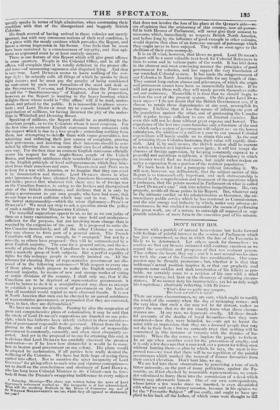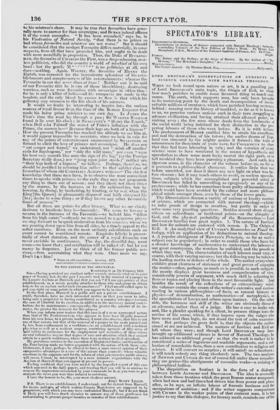DON'T I1URT IIIM.
Nowise with a particle of natural benevolence but looks forward with feelings of painful interest to the session of Parliament which has just commenced, as that in which the fide of the Favourite is likely to be determined. Let others speak for themselves : we
confess we find our breasts animated with contrary emotions as we regard the condition and prospects of that too eminent person. Time softens the heart, they say ; and it is DOW several weeks since we took the ease of the Favourite into consideration. Our com- passion may be thought premature ; but, whether it is that that nobleman's actual position inspires it, or that our prophetic soul suggests some sudden and dark termination of his felicity as pro- bable, we certainly come to a revision of his case with a mind attuned to mercy, and bent on the discovery of mitigating circum- stances. If we cannot deny his improprieties, yet let us duly weigh his temptations ; charitably reflecting, with Brims- " What's done we partly may compute,
But know not what's resisted."
There are many circumstances, we are sure, which ought to modify the wrath of the country when the day of reckoning comes: and the very idea that such a day may not be ffir distant, makes us regret the more that we do not exactly know what those circum- stances are. At any rate, we deprecate cruelty. All those dread- ful accounts of the deaths of royal favourites—how they were murdered—bow they were behaded, &c.—are apt to haunt the mind with an impression, that they are a doomed people that may not die in their beds: but we earnestly trust that nothing will be committed in this instance at variance with the dictates of hu- manity. When the dny comes, we imp:lure the people to forbear. In an age when societies exist for the prevention of cruelty, and it is only a few days ago that a man took out a patent for felling oxen without hurting them—a plan by which, lie says, the meat is im- proved too—we trust that there will be no repetition of the painful occurrences which marked the removal of former favourites from their envied elevation. Don't hurt him, we say. We are led into these observations by perceiving a tone of such bitter animosity, on the part of many politicians, against the Fa- vourite, as, if' not checked by reasonable representations, we ConSi- der calculated to hurry them into the commission of a deed which history may afterwards lament. One of our own correspondents, whose letter a few weeks since we inserted, is CVC11 dissatisfied with what we said on a flintier occasion, because in his opitlion we let the " Favourite Subject" off too easily, and ought to have ap- plied to his back all the lashes, of which some were thought to fall to his mistress's share. It may be true that favourites have gene- rally more to answer for than sovereigns; and BI7IIKE indeed affirms it of the worst examples. " It has been remarked," says he, in his Vindication of Natural Society, "that there is no prince so bad whose firrourites and ministers are not worse." But it should be considered that the modern Favourite differs materially, in some respects, from nil that have preceded him, and ought to be dealt with more mercifully in proportion. Thus, the Duke of BUCKING- EAM, the favourite of Cif ARLES the First, was a deep-scheming, rest- less politician, who did the country a world of mischief of his own head : but the gentle M *****''** is no politician at all, and does—nothing. Again, Wor.sny, the favourite of Hese): the Eighth, was censured for the immoderate splendour of his esta- blishments and sumptuousness of his entertainments : whereas the Favourite in our day never dines at Inane! Neither can it be said of our 'Favourite that he is cne of those bloodthirsty, destroying warriors, such as were fitvourites with sovereigns in olden time : for he is only a killer of ladies—all his conquests are made in the boudoir, and the only blood he causes to flow is that which his gallantry may summon to the fair cheek of his mistress.
It would no doubt be interesting to inquire into the various sources of royal favour from the time of the Roman Emperor that made his horse prime minister to our own day. In dsmys the First's time the road lay through a pun ; Sir WALTER RALEIGH found it lie over his cloak ; in SHAESPERE'S " Henry the Fourth," when Doll asks Falstaff the secret of Poins's influence with the Prince, the answer is—" Because their legs are both of a bigness !" How the present Favourite has reached the altitude we see him at, it would appear impossible to ascertain, since we look in vain for any of the points of entertainment enumerated by SHAKSPERE as formed to elicit the love of princes and sovereigns. He does not " eat conger and fbnnel," we understand, nor " drink off candles' ends for flapdragons," nor " ride the wild mare," nor even " wear his boot very smooth like unto the sign of the leg," (as the Foreign Secretary really does,) nor "Jump upon joint stools ;" neither are "their legs both of a bigness," we believe. Perhaps, therefore, we should be justified in retie-ring him rather to that subtler class of favourites of whom old CoaxEmes AGRIPPA writes—" The chiefest knowledge that these men have, is to observe the most convenient times to spcake with princes, to the ende they may not propounde any thing to them out of season ; and they electe not these times by the starres, by the heavens, or by the ephimerides, but by bowsing, by dining, by banketting, by hunting, or by rest, when the King [the Queen] is pleasauntly disposed and bath obtayned his [her] desire in some thing ; or if they knuwe any other favourable times of acecsse."
But all these are points for after history. What we are chiefly desirous to inculcate here is—humanity. We seem to foresee a reverse in the fortunes of the Favourite—we behold him " fallen from his high estate"—already we me moved to a generous pity— we step forward to bespeak moderation from his enemies, whom we see pouring down upon him from all sides, by a timely appeal to the softer emotions. Even on the most ordinary calculations such an event cannot be considered remote. Exquisite felicity is prover- bially of short duration, and the career of a royal filvourite was never enviable in continuance. The day, the dreadful day, must come—we know that ; and retribution will be talked of': but let not mercy be forgotten. Let us think of all his former public ser- vices,—first, ascertaining what they were. Once more we say, Don't Lu.t him!
• From an old translation. London, 1575.



























 Previous page
Previous page